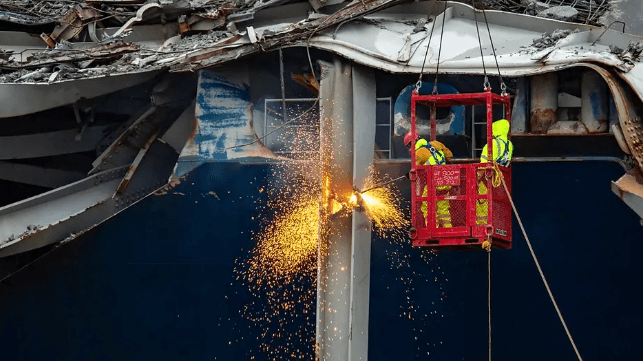Salvors Move Carefully Towards Big Lift to Refloat Boxship Dali

Salvors are still preparing for the operation to remove wreckage of Baltimore's Francis Scott Key Bridge from the bow of the container ship Dali, which struck a bridge pier and collapsed the main span of the structure on March 26.
Salvage crews have a difficult task ahead. Masses of steel and concrete are embedded in the deck towards the forepeak, and a twisted but intact stretch of the bridge span - dubbed "section four" in the response plan - is propped up on the Dali's port bow. The weight of that wreckage is pressing Dali's bow into the bottom, and it will have to be lifted off in order to refloat and remove the ship.
To get ready for the big lift, the salvage teams have to make careful plans for all of the side effects. Removing the weight of the bridge piece will affect the vessel and the wreckage on deck, potentially causing shifting of damaged containers and debris. Some of the bridge's steel girders have penetrated the Dali's deck, so the operation will have to be planned to prevent any unnecessary damage that the lift might do to the ship. To keep an eye on the complex conditions on scene, the team is using equally complex instrumentation.
“We’ve got a total of six . . . inclinometers that measure tilt on key locations of the span and key locations of the ship so we can watch how it’s pitching and rolling with tide, and wind,” said contractor Rob Ruthledge, a contractor working for the Key Bridge Unified Command. “We have a sensor measuring the relative position of the span on the ship so we can see, if for some reason, it starts to slip. We also have what are called string gauges, which can measure, in real-time, the stress, while they are performing operations.”
Smaller-scale cutting and hoisting operations have been making progress on Dali's starboard bow and main deck level for some time. The team has lifted off more than 180 intact containers to make more room for the operation, and contractors have been removing steel wreckage one piece at a time. Videos released by the joint multi-agency / commercial salvage operations center (the unified command) showed workers cutting off sections of the bridge wreckage that were dangling over the starboard side and letting them drop safely into the water.
The task force has signaled that it wants to refloat Dali and reopen a 45-foot shipping channel to the Port of Baltimore by May 10, subject to the uncertainties of marine salvage operations and the suitability of weather conditions. The ultimate objective is to fully reopen the channel at its nominal 50-foot control depth by the end of the month.

that matters most
Get the latest maritime news delivered to your inbox daily.
Rebuilding the bridge will take years longer, and will cost at least $1.9 billion, according to Maryland's transportation department. On Monday, Maryland Governor Wes Moore joined members of the House Appropriations Committee for a tour of the site and a discussion of the funding needed to restore the bridge to its former state. Gov. Moore and President Joe Biden have asked Congress to fully fund the bridge's reconstruction now, while awaiting the outcome of litigation against the Dali's owner, which is expected to take years to work its way through the court system. Legislation for funding the new bridge has been introduced in the Senate and the House, but faces skepticism from the right-wing House Freedom Caucus.
